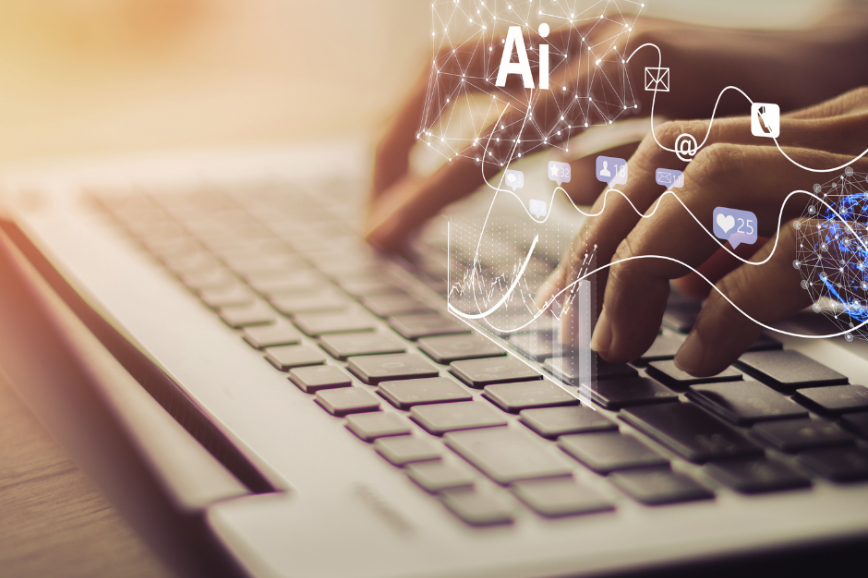7 Dangers You Face When Using AI In Marketing

In today’s ever-changing tech world, artificial intelligence (AI) is a huge deal across many industries. People love the idea of quicker, more efficient processes and automated tasks, so businesses and marketers are jumping on the AI bandwagon.
However, as with any new and evolving technology, there are risks to consider.
Although everyone‘s excited about AI, it’s important to consider the pros and cons of incorporating AI tools in your marketing. You don’t want to take an action that you might later regret.
In this post, we’ll discuss the seven biggest AI risks in digital marketing and how to avoid them.
1. AI Can Have Legal and Ethical Concerns
The integration of AI technology in digital marketing presents both legal and ethical concerns that mimic the growing pains of emerging technologies like digital advertising and social media. The problem is that it can take years for laws to catch up with the rapidly advancing tech world.
So, the widespread use of AI in digital marketing might seem amazing now, but it may become tricky in the future. Such change in the status quo could potentially disrupt entire digital marketing firms. Just think about AI and its collection of sensitive information and the risk of unauthorized personal data dissemination.
AI is not programmed to ask for permission before collecting data. It ignores most users’ privacy policies of most users — and that’s just one example.
2. AI Can Negatively Impact SEO
A major downside to AI is a lack of SEO. Many businesses think they can replace writers and let AI ChatGPT draft successful copy for their online sites.
However, when it comes to rankings, Google — and other search engines — prioritize excellent content, written for humans, by humans. While AI-generated articles may appear high-quality at first glance, the SEO algorithms view it otherwise, which can lead to lower rankings over time.
SEO requires a lot of time, effort, and expertise to implement, and you definitely can’t rely on AI tools like ChatGPT to optimize your article for you.
3. AI Produces A Robotic Tone That Fails To Connect With Readers
Using AI for content creation is more complex than simply requesting it to write an article on a specific topic. Businesses must put in additional effort to organize and structure the content effectively. AI-generated content may fail to connect with your audience.
The main reason is that it sounds robotic and lacks a distinctive tone or personality. This impersonal nature makes it difficult for the content to resonate on an emotional level with readers.
Effective content marketing requires understanding the audience’s emotions and tailoring the message accordingly, which AI currently can’t achieve.
To do that, you’ll need a human writer who has the expertise to write engaging content that resonates with the right audience.
4. AI-generated Content Is Often Inaccurate
Another significant danger of AI is that it’s only as reliable as the data it’s been trained on. Since algorithms ravenously scrub and analyze existing content available online, there’s a risk of producing inaccurate or outdated material.
ChatGPT recently displayed signs of laziness due to the lack of learnings from those using the tool and degradation in the prompts used. This alone proves that you cannot rely on the results that artificial intelligence provides you.
In terms of “facts,” AI-generated content often lacks proper citations, which can undermine a company’s credibility. Despite efforts to ensure accuracy, AI requires greater human insight for this critical task. As marketers, it’s imperative that the information we put out there is accurate, whether it’s for clients, demographics, or the broader public.
5. AI Can Display Negative Stereotypes
Researchers at USC examined two large AI databases and discovered that more than 38% of the data contained biases.
Bloomberg’s analysis of more than 5,000 images created with Stable Diffusion is just as shocking:
“The analysis found that image sets generated for every high-paying job were dominated by subjects with lighter skin tones, while subjects with were more commonly generated by prompts like “fast-food worker” and “social worker.”*
The prevalence of bias in AI has significant implications for marketers. Targeting ads that use platforms that exclude substantial portions of the population certainly undermines efforts to reach the broadest possible audience.
Beyond performance issues, there are more significant consequences if ads unfairly target or exclude specific groups. For instance, a real estate ad that discriminates against protected minorities could result in legal repercussions under the Fair Housing Act and scrutiny from the Federal Trade Commission. This is a big red flag to watch out for!
6. AI Content Is Highly Repetitive
When exploring AI technologies like ChatGPT, you may find that the responses it generates can be quite remarkable. They can be diverse, captivate, and even exhibit a semblance of human thought and behavior.
However, you’ll notice that after a while the content grows repetitive and even tired. Essentially, the same content gets reiterated with a similar tone.
This is a primary concern for digital marketers, so it’s a significant drawback to adopting AI tools.
7. Editing AI Content Is A Challenge
Editing requires time and significant attention to detail. It can take strong content and make it exceptional. But your content won’t get there if you rely solely on AI writing tools. ChatGPT requires revision and edits, preferably by content experts. For example, at GeistM, each draft goes through thorough editing by experienced writers to ensure it lands and resonates with its target audience.
High-quality content requires thorough planning, research, understanding of the topic, clarifying the key message, adapting the tone to suit the brand and audience, and multiple rounds of editing and proofreading.
Although AI can assist in planning and structuring content, human input remains essential in crafting meaningful and engaging content. If you’re not a seasoned editor or copywriter, hastily reviewing and publishing AI-generated content can actually do your business more harm than good.
Final Thoughts
AI tools are smart pieces of technology. They can grab an astonishing amount of information from various sources and provide lightning-quick answers within moments. But human creativity and strategic thinking remain key to crafting effective marketing campaigns, and that’s something AI just can’t provide — yet.
So, rather than risking your website authority with Google or burning money on weak marketing copy, let our human writers bring out the best in your marketing campaigns!
If you’re truly serious about growing your business, get in touch with GeistM today.
*Source: https://www.bloomberg.com/graphics/2023-generative-ai-bias/






